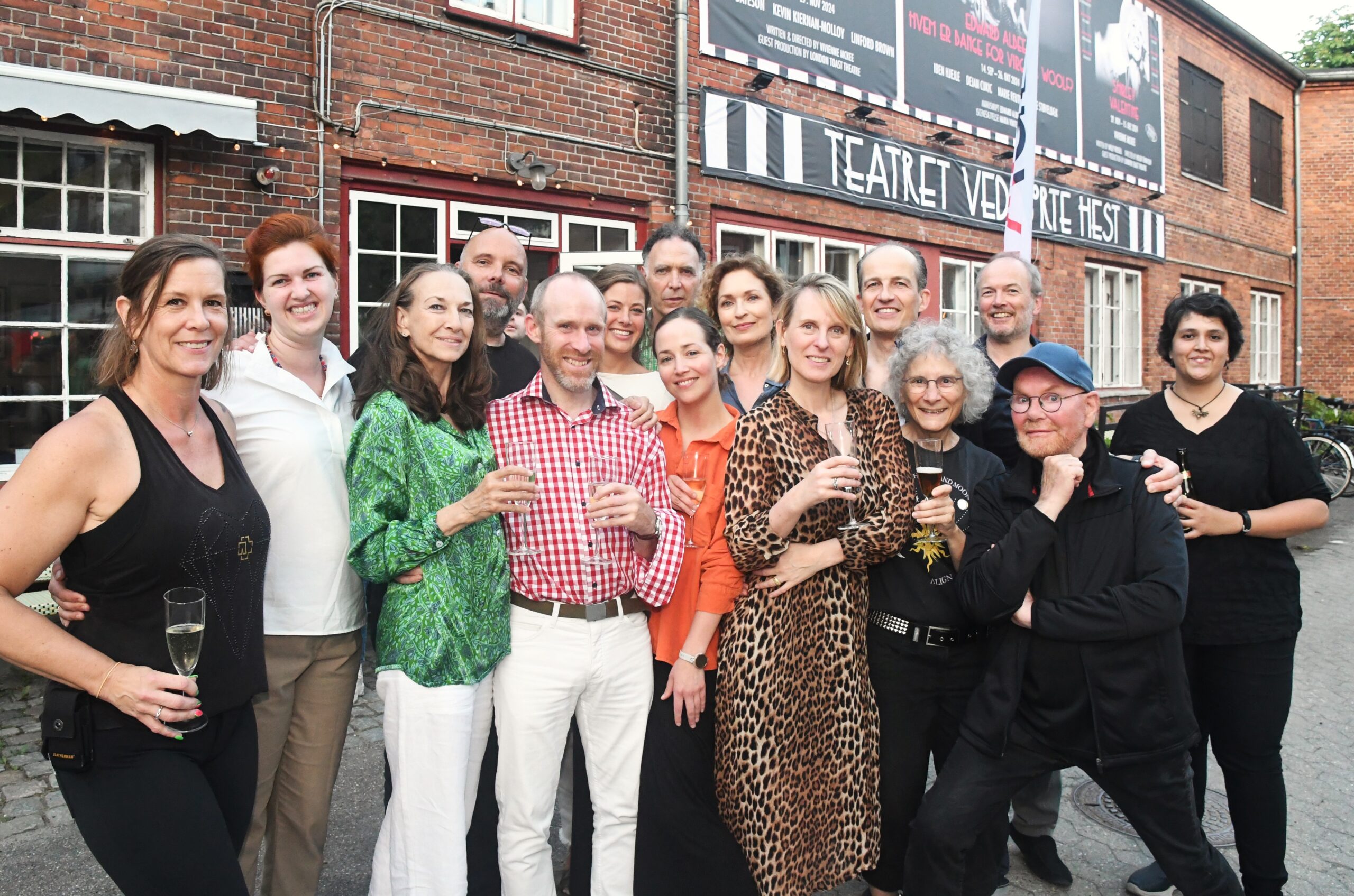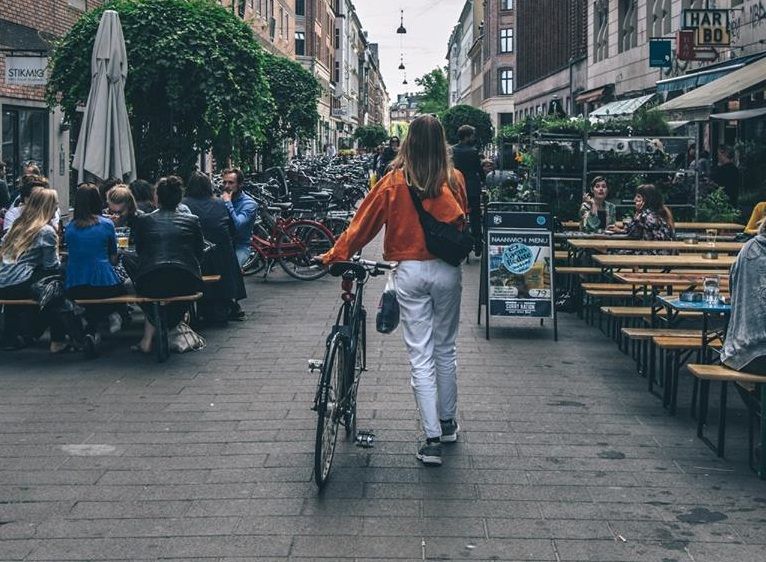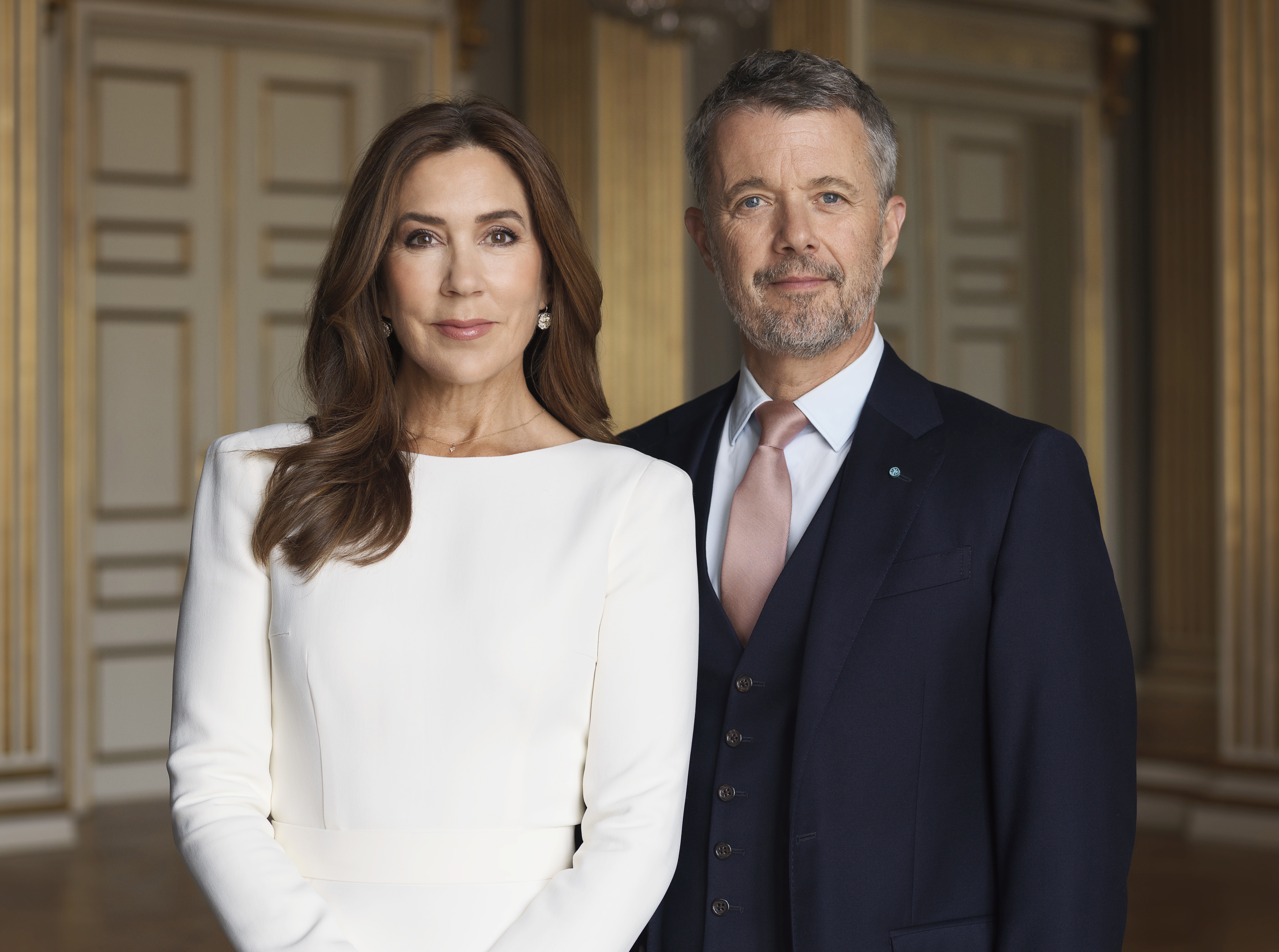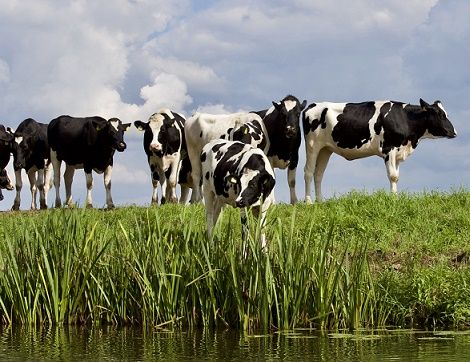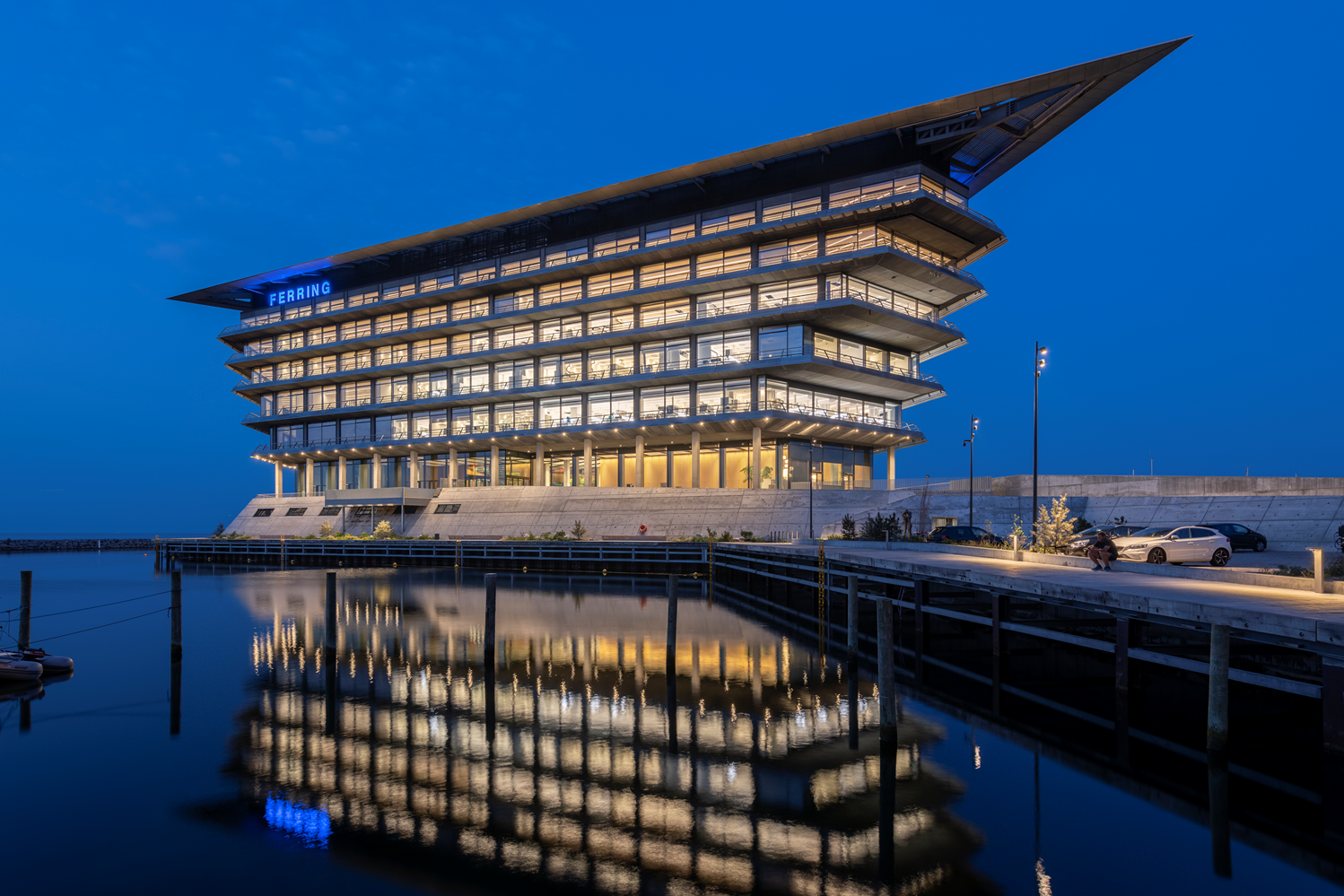You can feel the vintage of Teatret Ved Sorte Hest from the moment you enter.
Tucked behind a black door in a leafy Vesterbro courtyard, the tiny foyer, with an elegant chessboard floor and mini chandeliers, is just big enough for a group of friends to gather before they’re blocking the doorway.
On the walls is a muddle of black and white photographs of famous actors, scenographers, and writers – the many Danish and English talents who have cut their teeth here since the 1970s. To the left, an arthritic stairwell curves up to the tiny, 88-seat theatre above.
Hesten, as it is affectionately known, is not only one of Copenhagen’s oldest and most intimate stages – it’s also one of its greatest strongholds of English-language theatre.
Tonight the place is thronged with guests. Many are actors, producers and writers, here for a staged reading of Don’t Mention the War – the debut by British playwright Ben Hamilton, ex-editor of The Copenhagen Post.
It’s produced by HIT International Theatre Arts, a bastion of English theatre in Denmark, in collaboration with the international cross-border-festival Move the North.
There is much jovial backslapping, hugging and handshaking going on – a testament to the close-knit community of the international scene.
International relations on the Danish stage
Community is important tonight: though he’s a longtime stage reviewer, it’s Hamilton’s first time stepping into the limelight as a stage creative.
In Don’t Mention the War, he gives us a trio of cutting satires on war in Europe and Brexit.
The audience meets three couples, variously flirting, reminiscing, bickering or all-out rowing, who personify the last half century’s landmark political negotiations.
A loved-up young couple in bed, Steven and Janne, represent the 1972 Treaty of Accession, as they eagerly speculate about the future of Denmark and the UK in the European Community.
A pair of will-they-won’t-they lovers, Britain and Argentina, dramatise the Falklands War of 1982.
Seated either side of a chessboard, the pair erupt in a vicious, passionate spat. They alternate between squabbling over the footstool (the Maldives), making exuberant overtures, bragging about their exes, and hurling insults.
Finally, a mid-40’s Michael, representing Britain, and his mid 20’s girlfriend Persephone, representing Europe, grapple with his decision to cryogenically freeze himself to (Br)exit the relationship, without paying the consequences.
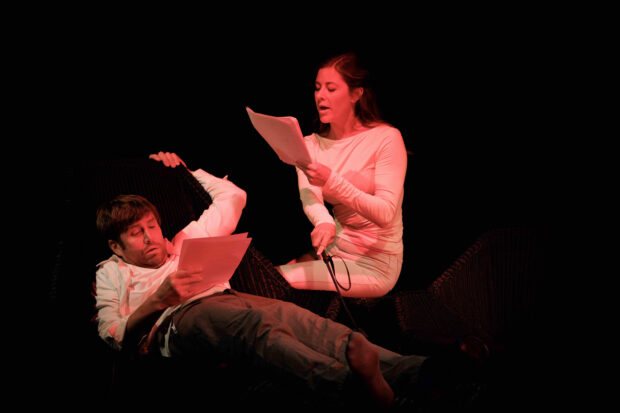
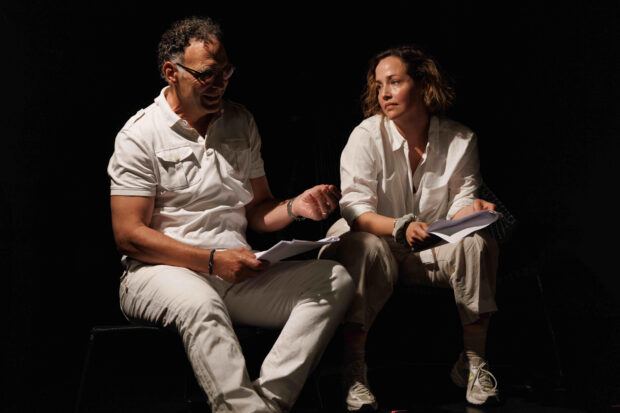
In terms of performing English language, Don’t Mention the War is a gymnast. It’s stuffed with political witticisms, erotic wordplay, and literary references.
Take, for example, a scene in which a dominatrix Europe circles a tied-up Britain, pondering whether to deliver the “bendy cucumber of Brussels”, or the “hard yellow dildo of EU law.”
It’s dense – there’s barely a second for a political metaphor to catch its breath before Hamilton has it doing flips again – and a little heavy-handed at times, but rollicking fun.
For a Brit audience, it’s unflinchingly dark, too – full of musings on the UK’s self-destruction, COVID, and the long shadow of imperialism.
Hamilton relishes twisting the knife: “Great Britain,” spits Argentina in the second act, “is the biggest oxymoron of all time.”
Though the tone might be deadpan, the structure is light-footed. Hamilton flips the script from historical to magical realism on a dime, without losing any of the narrative thrust.
Having seen so much English theatre in Copenhagen over the years, he knows he’s steering in a different direction.
“Most plays are boring and old: aimed at a small percentage of people. It’s our duty in theatre to engage audiences and switch them onto the thrill of live performance,” he says, adding that his favourite shows to watch always have “intensity, dark humour and something fresh”.
Making it as an English playwright
Hamilton’s work showed during Copenhagen’s summer theatre festival CPH Stage – an annual mixing pot of bold new theatre productions, both Danish and international.
But from page to stage, a play can take years to come to fruition.
You’d think Don’t Mention the War was inspired by Russia’s invasion of Ukraine in 2022. But Hamilton in fact started two years earlier, basing the story on a poem he wrote for his aunt’s funeral in 2019.
“It had been a while since I wrote it, or even thoroughly read it, so I was happy it hadn’t dated at all. The themes, given the state of Britain today and war breaking out on the continent, are as relevant as ever,” says Hamilton.
As an English playwright, getting your work staged is tough, and funding is hard to come by, says producer of Don’t Mention the War and founder and artistic director of HIT, Jana Pulkrabek.
She is well placed to compare Denmark’s scene with neighbouring countries’; Pulkrabek is deeply involved in cross-border theatre – not only through HIT, but as artistic director of Move the North, and CEO of the Hamburg-based film-and theatre company ManusArts.
“One of the big issues for English language theatre creatives in Copenhagen is the challenge of finding performance venues to present their craft. And it’s not getting easier,” she says.
Hamilton agrees: “I’m not sure I could do it myself. I’m grateful to Jana Pulkrabek and Vanessa Poole from HIT International Theatre Arts for their support and networking. They assembled actors, directors, crew and a musician – top notch production values all round.”
To get a foothold in the arts scene in Copenhagen, Pulkrabek says personal contact is the way to go: “Approach people and be flexible. As theatre makers, we are always in search of good and accessible material to perform and to work with more and more colleagues of calibre.”
British Sue Hansen-Styles is a self-taught actor who came to Denmark in 2001 with her Danish husband. In 2007, she co-founded Why Not Theatre Company (WNTC).
She points out that WNTC’s in-house playwright, Tanja Mastilo, got her start in theatre through personal contact. Actively presenting her work to other creatives was the key, she says.
“Tanja asked me to read her short stories many years ago and I was so taken with her writing style and talent that we created a new, devised production based on those short stories.”
“Since then, she has gone on to write a monologue, a podcast, many full-length plays for Why Not, and in 2021 she won Årets Reumert as playwright of the year!”
Making it as an English producer
Hansen-Styles, who art directs one full-staged English theatre production and several pop-ups for WNTC per season in Copenhagen, has always focused on new and experimental works.
Daring to think out of the box and take risks can pay off for an aspiring producer, she says.
“To be successful you need a clear vision, a strong team around you and an obstinate refusal to compromise on quality – whether it is the quality of your team, or the quality of the paper used for your programmes.”
But it’s no easy road and budgets are tight, she admits. “Producing professional English language theatre in Denmark is, and I suspect always will be, a challenge. Quality is not up for discussion, but quality requires money and raising funds is hard work.”
Building a strong relationship with a venue is pivotal. Pulkrabek, for example, calls Hesten a “home” for HIT. Consistently delivering quality theatre means the venue is more likely to accept risk-taking, which can allow new talents to enter the scene.
“I feel extremely happy to have found such well-loved stage for HIT to perform on. We are looking forward to our third season of collaboration with Hesten, a great privilege.”
“It is also one of the many great reasons why I wanted to put up Ben Hamilton’s play. Three one-act playlets with a cast of seven actors offered the opportunity to share this wonderful theatre venue with a large group of extremely talented artists.”
Making it as an English actor
Vanessa Poole, brand associate for HIT, co-founder of the Danish production company Down the Rabbithole Theatre and founder of Malmö-based Playmate, says that the scene is evolving for English-speaking actors.
In the past decade, one or two private Danish drama schools have launched acting diplomas in English, drawing young acting students to Copenhagen. They are raising the standard, she says.
“It’s cheaper than going to drama school in the UK or the US, and much easier to get in. These young hopefuls are forming their own little drama groups in English, in the evenings, being inventive, desperate to work. They are taking it seriously.”
While Poole cautions that big-budget productions filming in Denmark who need English-speakers “can always fly in models/actors from London and LA if they want to”, there is still scope, with a little luck, for an English actor in Copenhagen to get a big role.
“My sometime stage colleague in Copenhagen, actor Alex Lehman played an American in Carmen Curlers on Danish TV. Tom Hale, who has acted for us at HIT several times, played an American ambassador in feature film Hammarskjöld. So, English-language roles do happen occasionally!”
Aspiring playwrights and actors should get in touch with HIT International Theatre Arts in Denmark or Playmate in Sweden. “Call me!” she says. “We look for theatre-makers who have talent, training, experience – ideally all three!”
Do it for the love
Though theatre in Denmark won’t make you “rich or famous” says Poole, she wouldn’t change it.
“I love doing it. Theatre for me is where I am most myself. There is nothing else I would rather do.”
Pulkrabek agrees. “It is amazing how much fun you share together with fellow actors and the audience,” she says.
Looking back on the comedy HAP, which she co-produced with Poole for Hesten in 2024, she remembers the audience cracking up every single night. “It was the best reward!” she says.
Poole’s fondest stage memories are also of raucous, exuberant fun: like the international version of Det Kolde Bord, which she calls a “48-hour chaos theatre project”.
“It really was a meeting between Danish and non-Danish actors on stage on equal terms, with all of us laughing and sweating to pull together in just two days. All of us sharing one language, one experience, for a packed audience.”
“I really feel it was a moment of triumph – perhaps unique – when Danish speakers and English speakers met to act together live. Whether you trained in London or Copenhagen, it made no difference that day. It was fabulous.”
Now is an exciting time for theatre arts she says, with new ideas finding wings. “I think the visual quality of costume and scenography in live theatre seems to be getting bolder and more inventive, more exciting in Copenhagen.”
Hamilton is one of the latest new creatives to take the leap. Seeing his work performed was “very exciting” he says, and a second play is in the works.
Despite the hurdles to theatrical success in Denmark, the thrill of the stage is undeniable.

